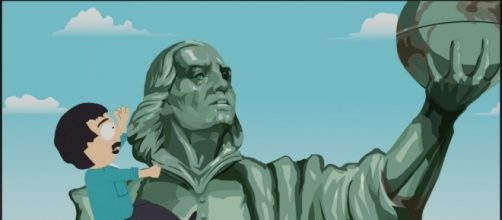“South Park” took a shot at the self-proclaimed victims of recent racial tension in the United States in their most recent episode, “Holiday Special.” And, in classic “South Park” fashion, they were not pulling their punches.
‘South Park’ and Christopher Columbus
The first act of "South Park's" “Holiday Special” depicted Randy Marsh and his personal crusade against Christopher Columbus and his legacy. However, there is no mention of Columbus’ crimes. There is only the tearing down of statues and pointing of fingers, largely by the aggravated community, consisting almost entirely of Randy Marsh.
However, as the “Holiday Special” progressed into the second and third acts, it is revealed that Randy was actually a supporter of Christopher Columbus before the public targeted his legacy. Once the tension grew and public opinion changed, Randy joined the aggravated protestors.
However, nobody really talked about Christopher Columbus in this week’s episode of “South Park.” The conversation was wholly directed at the people who failed to hate Columbus the same way Randy hated him. In one plot point, Randy goes out of his way to use a Native American man for his DNA in order to give his anger clout, effectively subjugating the Native American man in the process.
The only mention of Christopher Columbus and his accomplishments in “Holiday Special” came from the boys, consisting of Cartman, Stan, Kyle, Kenny, other male side-characters, and Shelley, Stan’s sister.
Cartman claims, “In 1492, Columbus got us a day off school,” and Shelley says to Randy, her father, “I don’t give a s*** about Columbus.”
The victims in ‘Holiday Special’
“South Park’s” Randy Marsh has always been prone to exaggeration, often taking hyperbolic stances on social issues and fads. Whether it is reality-tv cooking shows, tween-wave, global warming, or gentrification, Randy Marsh has almost infallibly been at the forefront of the action.
Though, in recent seasons of “South Park,” Randy Marsh has become the stereotypical social justice warrior, taking on social constructs on behalf of the people that have been belittled by society. In season nineteen, he joined the PC fraternity, hazing all those who failed to be politically correct.
In “South Park’s” most recent episode, Randy joined the people oppressed by the celebration of Christopher Columbus, going as far as to passionately kiss a Native American man just for his DNA, with the hope that a DNA test would back his political agenda.
A commercial for “DNAandMe,” a fictional service similar to Ancestry.com created by "South Park," showed what appeared to be white people with no apparent racial background claiming to be a certain “percent victim,” indicating a person’s status as a victim comes from their DNA rather than their experiences.
It seemed as though the “South Park” creators wanted to show the modern victim’s mentality, where the victim is often the one pointing fingers and being hateful towards those who are indifferent to the social problems that the victim has perceived.
By qualifying their status as victims, they reserve the right to criticize those who are merely bystanders.
What’s the point?
“South Park” was very heavy-handed with their satire in "Holiday Special" by their own admission, but the statement was clear: not everybody fighting for social justice is doing it for the good of the oppressed. They do it for themselves, they do it to be angry, and they do it to control society’s moral high ground.
But then the question becomes: if the ones spreading hatred are the victims, are they really the victims, or are they using their status as victims to perpetrate hatred, making them the very thing they hate? See “South Park’s” answer in season twenty-one, episode three: “Holiday Special.”


